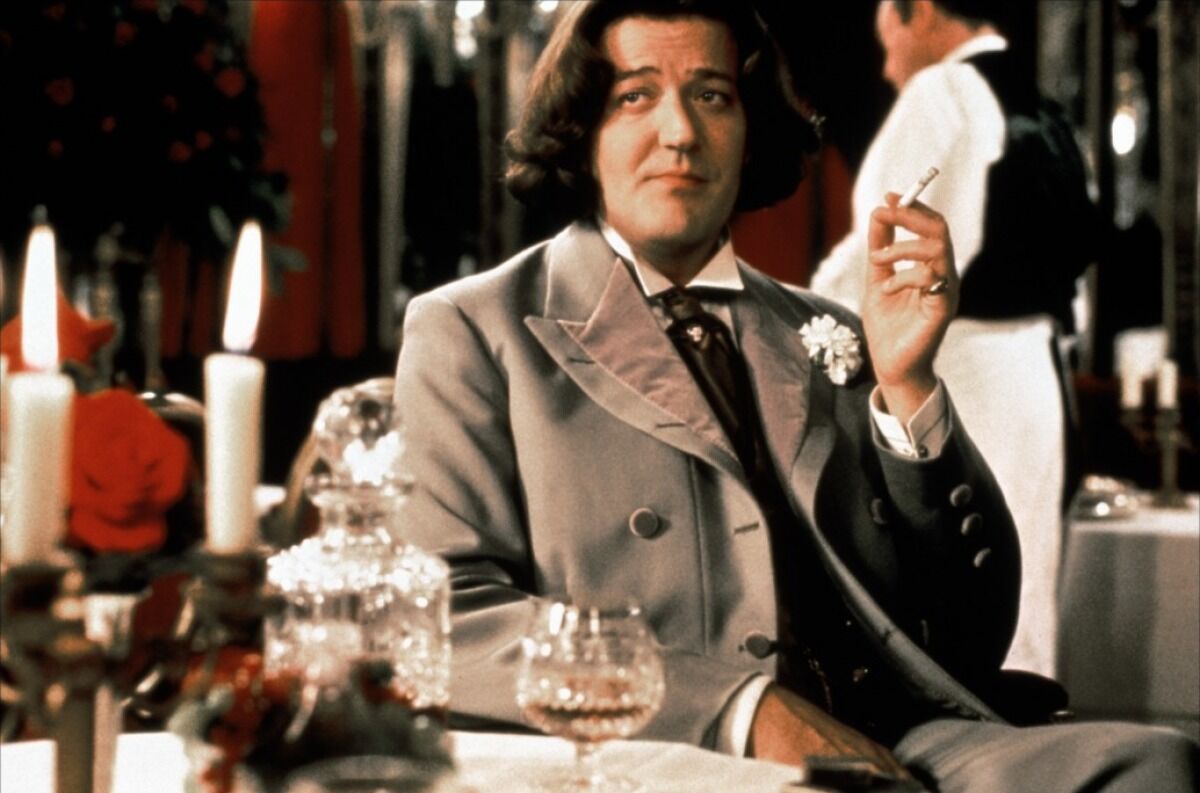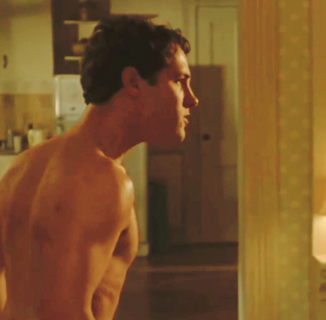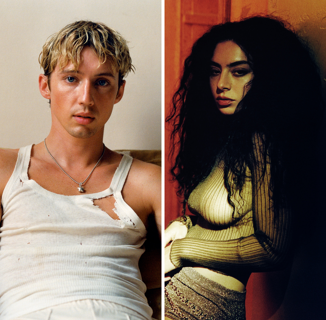“There are two boys waiting out there,” a young Jude Law snipes at an ailing, bed-ridden Stephen Fry. “If you’re not coming, I’ll f*ck them both myself.”
Imagine: it’s 1997, and you’re about to see the explicit Oscar Wilde biopic you’ve always dreamed of. This adaptation, based on Richard Ellmann’s exhaustive, definitive biography of Wilde, will finally go into detail about Wilde’s sex life, primarily his tortured and tortuous relationship with ur-twink Lord Alfred “Bosie” Douglas. English comedian and actor Stephen Fry, a Wilde scholar himself, takes the title role, while the role of Bosie is given to a young, high-buttocked Jude Law at the very peak of his beauty. Michael Sheen plays devoted friend to Wilde (and possible first sexual partner) Robbie Ross, and while previous attempts at putting the Wilde story onscreen have focused largely on the trial, this new take will finally, FINALLY actually deal with the fact that Wilde proudly screwed guys, lots of guys, and got thrown under the bus by a lot of them.
And then you sit down in the theater: the film starts. The credits start to roll, featuring cast names inlaid with an Aubrey Beardsley-esque typeface set against the sweeping Colorado skyline…
And it’s here that you stop and think to yourself, what? Why on earth are they choosing to open a film about Oscar Wilde in Colorado, of all places? Why am I watching an opening credit sequence that feels more aligned with “City Slickers 2: The Legend of Curley’s Gold” than the story of one of the world’s most influential queer playwrights?
That’s the first question you ask yourself, and it certainly will not be the last. For Brian Gilbert’s biopic is many things, but above all it is confusing in its choices. Oscar Wilde, as many already know, was an Irish playwright who lived primarily in England, except for a year-long stint in 1882, when Wilde was invited by the Opera impresario Richard D’Oyly Carte (best known for his patronage of the Gilbert and Sullivan operettas) to tour America giving lectures on subjects like “beauty in the home.” Randomly enough, Leadville, Colorado was a stop on this tour, and even more randomly, the film feels it appropriate to open on a half-imagined meeting being Wilde and a group of young, shirtless miners. That’s correct: the story doesn’t begin at Magdalen College, Oxford, where Wilde scandalized classmates by stating that his life’s goal was to “live up” to his collection of blue china and where he met mentor and chief aesthete Walter Pater. It doesn’t begin during Wilde’s entrance into London society, where he met the actress Lilly Langtry and nearly proposed marriage to the woman who would eventually become Bram Stoker’s wife, Florence Balcombe.
It doesn’t even begin with his first poetry collection, which made him an object of fascination and ridicule for British society, leading Gilbert and Sullivan to write the operetta “Patience” as a parody of his effect on the culture. Nope. It starts in Colorado, because this movie is bonkers.
I say all this as someone who, despite finding this movie so bad and so stupid, can’t stop watching it. During hard times, when bad things just keep happening and you can’t seem to dig yourself out of the hole depression has placed you in, some people find it a comfort to watch rom-coms or beloved feel-good movies from their past. Not me. I watch Wilde over and over and over again. Not because it’s good (it’s not) and not because I like it (I don’t!) but because something about it is extraordinarily soothing. I guess there’s nothing that puts your own pain in perspective like a bad movie about Oscar Wilde’s life, which was, in itself, a kind of trash fire. But Wilde does even the Wilde tragedy one better: it’s at once a cautionary tale, a forbidden romance, and a piece of unabashed camp. And yes, you get to see a young Jude Law’s ass a fair amount of times, so there’s that. But mainly, it’s an extremely sappy movie that casts Wilde as a tortured, penitent lover of men who only starts enjoying a gay lifestyle at the age of 40, after his marriage to Constance Wilde and the birth of his two sons Cyril and Vyvyan. True, that’s what Ellmann’s biography theorized at the time, and clearly that’s what the movie went off of. We now know that Wilde perhaps didn’t pursue anal sex with men before middle age, but he probably practiced at least intercrural sex with them and cohabitated with quite a few lovers before getting married. But the framework of the film relies on the assumption that Wilde’s gayness was his chief source of misery rather than the combination of his truly evil boyfriend or the prudishness and homophobia of his society. Which makes for a pretty ridiculous take on one of history’s famous provocateurs. Instead of the bold, couldn’t-give-a-f*ck portrait we get in Ellmann’s biography and other biographical accounts, we get a weepy, depressing Wilde who just wants to be monogamous with his boyfriend. Which was simply not the case.
Wilde does even the Wilde tragedy one better: it’s at once a cautionary tale, a forbidden romance, and a piece of unabashed camp.
Stephen Fry’s performance is solid, and on the whole, he delivers what people, in 1997, probably wanted to see: Wilde as martyr, Wilde as tragic homosexual. Even Wilde as prude, as evidenced in a hilarious scene where Bosie drags Wilde to the house of procurer Alfred Taylor for some trade. “Variety is the spice of life,” Bosie tells a deject Wilde, who in real life enjoyed sex with a lot of guys and was definitely far from monogamous. Once they get there, Wilde has to be coaxed into having sex with the rent boys. Because again, this is a movie that’s deeply ashamed of itself. As it should be–but not for the reasons it thinks.
Look, I’m not saying that 1997 was ready for a story about the real Wilde, the one who basically said out loud to the whole of British society, “hey guess what, I’m a flaming homosexual” and then was criminalized for it. But we deserved a better movie than this, and we still do. That said, I’ll keep watching Wilde because I’m addicted to those stories of gay pain that we loved in the 90s. I love Maurice, and I’ll watch Another Country until the cows come home, and don’t get me started on My Own Private Idaho. The difference is that those stories are about fictional sad gay men (Another Country is not, but it’s great for other reasons) and not about a gay hero who—both in his own time and now—suffered not because he was gay, but because he was brave enough—and perhaps show-offish enough—not to hide it.
That’s the tragedy of the Wilde story: it also accounts for a great deal of the painful comedy of his fall. For instance: during the trial sequence in Wilde, does the film make any mention of the exchange that actually got Wilde convicted? It does not. Instead, it leans on the cinematic moment of Wilde delivering his “the love that dare not speak its name speech” and leaves out the hilarious, horrible, and history-changing moment of the trial that actually brought the writer down.
During the trial—in which the prosecution barrister was Edward Carson, someone Wilde knew from his youth, and who attacked him with “all the added bitterness of an old friend”—the case’s defining moment came after Carson called the court’s attention to the string of servant boys and renters who had frequented his and Bosie’s apartments. He referenced one such boy who was a servant in Wilde’s London home on High Street. He asked whether Wilde had ever kissed the boy. Wilde, who up to this point had been treating the trial as a form of performance art, busting out casual epigrams and half-answers with his trademark insouciance, replied that no, he had not, because the boy was “unfortunately extremely ugly.”
That was the moment when Carson knew he’d uncovered something game-changing. Would you have kissed him if he hadn’t been ugly? He asked. But it was too late: Wilde had to backpedal. He lost his composure. What started as a libel suit against Bosie’s deranged father ended up sentencing Wilde to two years of hard labor on the charge of “gross indecency,” aka anal sex with men. At the time, most men of his class background weren’t expected to last even six months of this kind of sentence.
Wilde did, of course, but when he got out, he was abandoned by many of his friends and the society at large. He spent the remainder of his years in Paris, borrowing money from friends and “dying beyond his means.”
Wilde the movie doesn’t get into this. It leaves us off at Bosie and Wilde’s last reunion in Rome, leaving us with a kind of optimistic window into their future.
It didn’t work out that way: Constance Wilde cut her husband off when she learned he was seeing Bosie again, and the bitterness between them only grew until their final break shortly after the Rome trip. But the film is not interested in Wilde’s story as a ghost story: only as a love story. And to boil it down to that is sad, depressing, and absurd.
That said, there is a better account of the last months of Wilde’s life out there, in 2018’s The Happy Prince, an auteurist effort by Rupert Everett, who makes the choices that 1997’s Wilde is afraid to. Or perhaps simply never considered in the first place. The Happy Prince is a slow, sad picture of decay, a portrait of the artist as an abandoned yet unapologetic figure. Yet it is not a tragedy, because The Happy Prince understands something, fundamentally, that Wilde doesn’t: that Wilde wasn’t just a meaningless symbol or a political figure or a Christ parable or a God. He was a person, more self-assured than most, who ultimately accepted his nature. Attempts to tell Wilde’s story often suffer from trying to make Wilde too emblematic of a certain kind of liberalism, or too modern, or two martyred. They lose the person inside of that fantasy. Wilde is one such movie. And for all its pleasures and campiness and well-lit buttocks, it fails him for this reason.
It’s sad, I think, to see meaningful historical figures lose the things that make them human as history attempts to reshape them in its own image. In the 70s, Wilde was a martyr figure, someone who died for being who he was. In the 90s, he was a tragic figure in a world in love with stories about tragic, dying gay men. In the 2000s he was a social justice warrior, someone who would have “loved Tumblr”, a poster of whose face hung in one of the starter Williamsburg apartments of Lena Dunham’s cis, straight heroine Hannah Horvath in “Girls.” You know your legacy has become meaningless when straight girls start claiming you as an icon.
And what is Wilde to us today? I’m not sure. All these things, perhaps. Problematic, perhaps. But my hope for us—and for him—is that we can let the layers of adaptation fall away eventually to present him to us as he was, or at least, as close to that as we can get. Someone who was both of their time and outside of it, but with an eye, perhaps, toward the future that he dreamed would come for us eventually.♦
Help make sure LGBTQ+ stories are being told...
We can't rely on mainstream media to tell our stories. That's why we don't lock our articles behind a paywall. Will you support our mission with a contribution today?
Cancel anytime · Proudly LGBTQ+ owned and operated
Read More in Entertainment
The Latest on INTO
Subscribe to get a twice-weekly dose of queer news, updates, and insights from the INTO team.
in Your Inbox















